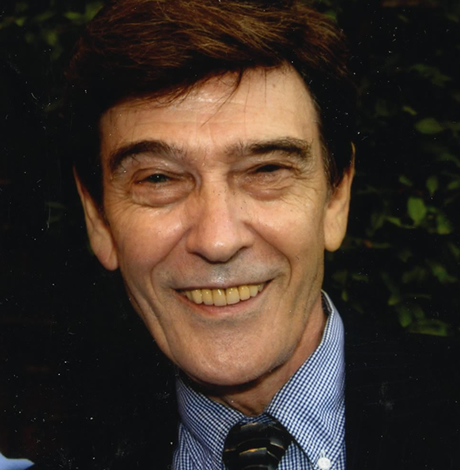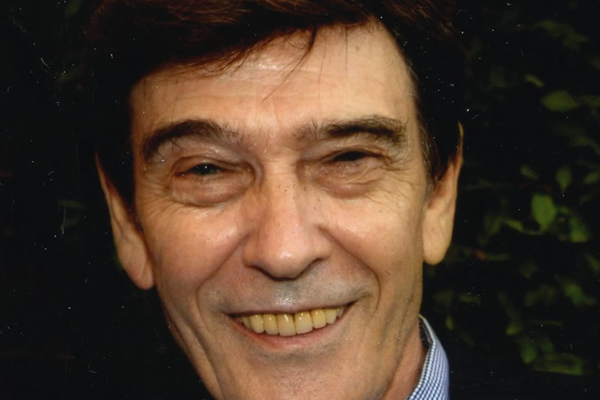Local
Cliff Witt, early D.C. gay rights strategist, dies at 77
Co-founder of GAA was manager at Ziegfeld’s-Secrets


Clifton R. Witt was one of six founders of D.C.’s Gay Activists Alliance in 1971. He died Sept. 9.
Clifton R. “Cliff” Witt, who was one of six founders of D.C.’s Gay Activists Alliance in 1971 and worked for more than 20 years as a director of film and video for a company that makes industrial training movies before becoming a manager at the D.C. gay nightclub Ziegfeld’s-Secrets, died Sept. 9 at George Washington University Hospital. He was 77.
Friends and co-workers at Ziegfeld’s-Secrets said he lost consciousness at the club just after its 3 a.m. closing time on Saturday and was taken by ambulance to the hospital where he died later that morning. His brother, Clyde Witt, said the D.C. Medical Examiner’s office informed him the cause of death was chronic pulmonary lung disease.
His friend and former roommate Glenn Berkheimer said Witt had been suffering from a lung ailment in recent years due to his long history as a heavy smoker.
Clyde Witt said Cliff Witt began his career as a Peace Corps volunteer in the early 1960s in Latin America, where he served for at least two years in Columbia and became fluent in Spanish.
He entered the Peace Corps shortly after receiving a bachelor’s and master’s degree in film production and direction at Northwestern University in Illinois, according to Clyde Witt. Clyde Witt said his brother was born in Cleveland and raised in nearby Maple Heights, Ohio. He graduated from Maple Heights High School in 1958.
Clyde Witt and others who knew Cliff Witt said he devoted most of his working career as a filmmaker for the communications division of the Bureau of National Affairs, or BNA, a D.C.-based news organization that specializes in business-related news and produces educational and training movies.
A BNA official said Witt worked for the company as Director of Film & Video from January 1973 until December 1995.
Roberta Hantgun and Mark Daniels were hired by Witt in the late 1970s as freelance camera operators and worked on many of the film projects directed by Witt.
“We did safety training films,” Daniels told the Washington Blade. “Some showed industrial accidents. We did a sexual harassment training series about sexual harassment in the workplace,” he said. “They were very creative.”
Hantgun said Witt had a “great sense of humor” as he led his production crew on locations throughout the country, including industrial waste sites.
“Cliff was a good man and great to work with,” Daniels said. “He always pushed himself and his crew to do better in a very compassionate way.”
Longtime D.C. gay activist Paul Kuntzler said Witt played an active role in the groundbreaking 1971 election campaign of gay rights pioneer Frank Kameny, who became a candidate for the newly created D.C. Congressional Delegate seat in Congress. It was the first time an openly gay person had run for a federal office.
Kuntzler, who served as manager of the Kameny campaign, said Witt served as assistant manager. Among other things, Witt used what Kuntzler said was his “remarkable” organizational skills to arrange for several busloads of volunteer campaign workers to travel from New York City to D.C. to help gather several thousand signatures needed to get Kameny’s name on the ballot.
Kameny finished in fourth place in a six-candidate race, receiving just under 1,900 votes, a few hundred more than a candidate who expressed anti-gay views during the campaign. Although Kuntzler, Witt and the others working on Kameny’s campaign didn’t expect Kameny to win, they considered the effort a success in achieving their goal of drawing attention to the gay issues that Kameny raised during the campaign.
Shortly after the campaign ended Witt joined Kuntzler and four others involved in the campaign in launching the D.C. Gay Activists Alliance, which they modeled after a group by the same name in New York City.
Witt has been credited with playing a key role in one of the group’s first major protest actions – a “zap” or “invasion” of the annual national conference of the American Psychiatric Association, which took place at D.C.’s then Shoreham Hotel.
Details of Witt’s role in the action appear in the 1999 book “Out for Good: The Struggle to Build a Gay Rights Movement in America” by New York Times writers Dudley Clendinen and Adam Nagourney.
The book notes that GAA targeted the psychiatrists because of their refusal at that time to remove homosexuality from the APA’s official manual listing it as a mental disorder. Kameny, who held a Ph.D. in astronomy from Harvard University and had been a practicing scientist, was among the first to speak out against the APA listing of gays as “sick,” saying it was based on “junk” science.
With advance planning and direction by Witt, a group of mostly GAA members along with members of the then-D.C. Gay Liberation Front stormed the stage in a large ballroom at the hotel where more than 1,000 of the psychiatrists were assembled, the book reports. Kameny, who was already on stage as a panelist, grabbed a microphone from one of the speakers and “lectured” the psychiatrists on their wrongful beliefs on homosexuality, according to Kameny’s own account in later writings.
In December 1973, about two years after the GAA zap, the APA announced that its board of trustees had voted to remove homosexuality from its Diagnostic and Statistical Manual as a mental disorder. It was a development considered a stunning victory for the newly emerging modern gay rights movement.
Gay activist Richard Maulsby credits Witt with getting him involved in gay activism in D.C. shortly after the two became roommates. Maulsby, who went on to become one of the founders and the first president of the D.C. Gertrude Stein Democratic Club, said Witt also became involved in the 1970s as an avid bird collector and breeder as a hobby.
“But in that early period of time, especially during the Kameny campaign, he was very instrumental in the gay movement,” Maulsby said. “He made substantial contributions early on in a very important period and that provided the foundation for everything that’s happened since then.”
Witt’s brother Clyde said he believes Witt retired from his filmmaking career at the BNA, which later became known as Bloomberg BNA, in the late 1990s. “And then after that he just sort of did whatever he wanted to do,” Clyde Witt said.
According to friends and co-workers at Ziegfeld’s-Secrets, it was around that time that Witt redirected his energy in “retirement” into a new career as a manager at Secrets, where, among other things, he supervised and arranged the scheduling of the club’s nude male dance performers. He also served as the graphic designer for the club’s promotional advertising.
His fluency in Spanish became especially helpful, friends said, in supervising and mentoring the club’s many immigrant Latino dancers whose English speaking abilities were limited before becoming themselves fluent in English.
“He made us feel like we were part of a team,” one of the Secrets dancers told the Blade on Sunday. “He treated us with respect.”
Those familiar with the club said Witt often performed his scheduling duties, with his laptop or iPad in his hands, while sitting on a stool reserved for him at Secrets’ front bar and while sipping black coffee from a beer mug.
“I’ll always remember him sitting on that stool talking to customers and fellow staff members,” said one of the club’s regular customers.
On Sunday night, just one day after Witt passed away, employees placed a beer mug filled with coffee on the bar in front of the empty stool where Witt used to sit. They placed a small vase with flowers next to the mug and a cookie on a napkin along with a note that said, “For Cliff: May you always have hot coffee.”
Clyde Witt said plans for a memorial service would be announced at a later date. Ziegfeld’s-Secrets co-owner Steven Delurba said the club plans to organize its own memorial gathering for Witt in the near future.
Maryland
Silver Spring holds annual Pride In The Plaza
‘Today means inclusion. It means to build resilience’

Silver Spring’s annual Pride in the Plaza event took place on Sunday to celebrate the LGBTQ community and emphasize inclusion and resilience.
“Today means inclusion. It means to build resilience, love,” Robyn Woods, program and outreach director for Live In Your Truth, which organized the event, said. “I mean, just being surrounded by the community and so many great entrepreneurs, business owners, and just being a part of this whole rainbow coalition that we call the LGBTQIA to be about.”
With the event being her first time organizing for Live In Your Truth, Woods said she felt emotional to see the support and love at the event.
“Some people (are) bringing out their children, their babies, their grandparents,” Woods said. “It’s a lot more allies here than anything else. That type of support to me means so much more than just support from my community; just outside support, inside support, so much support around it, so much love. Everyone’s smiling outside, helping each other.”
Attendees of the event were able to head over to the Family Fun Zone, an air-conditioned Pride Cool Down Lounge, or watch live drag performances in the main stage area.
Along with entertainment and a shaved-ice stand, rows of information tables stood along the plaza, including FreeState Justice, the Washington Spirit, Trans Maryland, Moco Pride Center, and the Heartwood Program, an organization that offers support, therapy, education, and resources to the LGBTQ community.
“I want people to know about our services, and I love what we have to offer,” Jessica Simon, psychotherapist for Heartwood Program’s Gender Wellness Clinic, said. “I (also) want to be part of a celebration with the community, and so it feels good to be here with other people who have something they want to give to the community.”
She added that within today’s political climate, to which she called an “antidote to shame,” it’s important to be celebrating Pride.
“There’s a lot of demonization of LGBTQI people,” Siena Iacuvazzi, facilitator for Maryland Trans Unity, said. “(Pride) is part of the healing process.”
Iacuvazzi said she was taught to be ashamed of who she was growing up, but being a part of a community helped her flourish in the future.
“I was taught how to hate myself. I was taught that I was an abomination to God,” she said. “But being a community is like understanding that there are people who have experienced the same thing, and they’re flourishing. They’re flourishing because they’re willing to stand up for themselves as human beings and discover themselves and understand what’s true for themselves.”
She added that Pride allows for a mutual understanding to take place.
“It’s more of a sense of belonging … and just taking that home and understanding you’re not alone,” Iacuvazzi said. “We’re each taking our own journey — we’re not putting that on each other. It’s just walking away with a sense of belonging and humanity.”
Similar to Iacuvazzi, Woods said she hopes attendees’ biggest takeaways would be family, fun, resilience, and pride.
“Being proud of yourself, being happy for who you are, and representation and how much it matters,” she continued. “And I think all these young people that are walking around here get to see versions of themselves, but older. They get to see so many different lesbian, gay, bisexual, pansexual people that are successful, that are showing love, that care, and it’s not how we’re portrayed in the media. It’s lovely to see it out here. (It’s) like we’re one big old, happy family.”
Virginia
Spanberger touts equality, reproductive rights in Arlington
Democratic Va. gubernatorial nominee made campaign stop at Freddie’s Beach Bar

With the general election heating up and LGBTQ rights under increasing threat nationwide, Virginia gubernatorial candidate Abigail Spanberger brought her “Span Virginia Bus Tour” to Arlington’s Freddie’s Beach Bar for a campaign stop filled with cheers, policy pledges, and community spirit.
Spanberger, who served three terms in the U.S. House of Representatives from 2019 through early 2025 for Virginia’s 7th Congressional District, also served as a federal law enforcement officer specializing in narcotics and money laundering cases, and as a CIA case officer working on counterterrorism and nuclear counterproliferation.
Spanberger is running against Republican nominee Winsome Earle-Sears, the current lieutenant governor of Virginia, who said she was “morally opposed” to a bill protecting marriage equality in the commonwealth.
She was joined by other Democratic candidates and supporters: lieutenant gubernatorial candidate Ghazala Hashmi, attorney general candidate Jay Jones, Virginia state Sen. Adam Ebbin (D-Alexandria), and Congressman Don Beyer.

Freddie’s was packed wall-to-wall with supporters, many of whom wore “Spanberger for Virginia” shirts in the progressive Pride flag colors. In her speech, she made it clear that LGBTQ Virginians’ rights are on the ballot this year.
“I’m so excited to be here, and I am so grateful to the entire staff of Freddy’s for letting us overtake this incredible venue that is not just an awesome place to come together in community, but is a symbol to so many people of joy, of happiness, of community and of celebrating our friends and our neighbors,” Spanberger told the packed restaurant. “It is exciting to be here, and particularly during this Pride month, and particularly as we reflect on the 10-year anniversary of Obergefell and the reality that we still have so much work to do.”
“The reality is there are so many people who still would be inclined to take us backwards,” she said. “In this moment when we see attacks on people’s rights, on people’s humanity, on Virginia, on our economy, on research, on public education, on food security, on health care, on Virginians, on their jobs, on public service and on people — it can get heavy.”
“What it does for me is it makes me want to double down, because once upon a time, when I was talking to my mother about some horror show or sequence of activities coming out of a particular administration, she did not really have the patience to listen to me and said ‘Abigail, let your rage fuel you’ — and the conversation was over. And so I reflect on that, because, in fact, every day there is so much fuel to be had in this world and in this moment.”
One of the points Spanberger continued to emphasize was the importance of steadfast state government officials following the election of President Donald Trump, which has led to rollbacks of LGBTQ and bodily autonomy rights as a result of the conservative-majority U.S. Supreme Court.
“What the past few years have shown us is that a Supreme Court decision, no matter how many years we have celebrated its existence, does not protect us in the long term. And so as governor, I will work to make sure that every protection we can put in place for the dignity, the value, and the equal rights of all Virginians is a priority.”
During her speech, Spanberger highlighted several of the key values driving her campaign — protecting reproductive freedom and human rights, lowering healthcare costs, safeguarding Virginia’s environment, and ensuring that public education is affordable, accessible, and rooted in truth, not politics.
Spanberger went as far as to say that she wants to amend the state’s constitution to remove Section 15-A. “The reality is that in Virginia, we still have a ban in our state constitution on marriage equality. It is of the utmost urgency that we move forward with our constitutional amendment.”
“We will work to ensure that that terrible constitutional amendment, that was put in years ago, is taken out and updated and ensuring that Virginia is reflective in our most essential documents of who we are as a commonwealth, which is an accepting place that celebrates the vibrancy of every single person and recognizes that all Virginians have a place, both in that constitution and in law,” she added.
Following the event, two supporters spoke to the Washington Blade about why they had come out to support Spanberger.
“I came out because I needed to show support for this ticket, because it has been a particularly rough week, but a long few years for our rights in this country, in this state, with this governor, and it’s — we need to flip it around, because queer people need protection,” said Samantha Perez, who lives in Ballston. “Trans people need protection. Trans kids need protection. And it’s not gonna happen with who’s in Richmond right now, and we just need to get it turned around.”

“The whole neighborhood’s here. All our friends are here,” said Annie Styles of Pentagon City. “It means the world to me to take care of each other. That’s what a good community does. That’s not what we’ve had with the Republicans here or across the nation for a really long time. It’s time to show that care. It’s time to make sure that good people are in a position to do good things.”
District of Columbia
Activists protest outside Hungarian Embassy in DC
Budapest Pride scheduled to take place Saturday, despite ban

More than two dozen activists gathered in front of the Hungarian Embassy in D.C. on Friday to protest the country’s ban on Budapest Pride and other LGBTQ-specific events.
Amnesty International USA Executive Director Paul O’Brien read a letter that Dávid Vig, executive director of Amnesty International Hungary, wrote.
“For 30 years Budapest Pride has been a celebration of hope, courage, and love,” said Vig in the letter that O’Brien read. “Each march through the streets of Budapest has been a powerful testament to the resilience of those who dare to demand equality, but a new law threatens to erase Pride and silence everyone who demands equal rights for LGBTI people.”
“The Hungarian government’s relentless campaign against LGBTI rights represents a worrying trend that can spread normalizing division and hatred,” added Vig. “Thank you for standing with us when we refuse to be intimidated.”
Council for Global Equality Chair Mark Bromley and two of his colleagues — Stephen Leonelli and Keifer Buckingham — also spoke. Health GAP Executive Director Asia Russell and Chloe Schwenke, a political appointee in the Obama-Biden administration who worked for the U.S. Agency for International Development, and Planned Parenthood staffers are among those who attended the protest.
(Washington Blade video by Michael K. Lavers)
Hungarian lawmakers in March passed a bill that bans Pride events and allow authorities to use facial recognition technology to identify those who participate in them. MPs in April amended the Hungarian constitution to ban public LGBTQ events.
Budapest Pride is scheduled to take place on Saturday, despite the ban. Hundreds of European lawmakers are expected to participate.
“Sending strength to the patriotic Hungarians marching tomorrow to advance human dignity and fundamental rights in a country they love,” said David Pressman, the gay former U.S. Ambassador to Hungary, on Friday on social media.
Sending strength to the patriotic Hungarians marching tomorrow to advance human dignity and fundamental rights in a country they love. Szabadság és szerelem. My past remarks on Budapest Pride: https://t.co/y1QhA9QouA
— David Pressman (@AmbPressman) June 27, 2025
-

 U.S. Supreme Court3 days ago
U.S. Supreme Court3 days agoSupreme Court upholds ACA rule that makes PrEP, other preventative care free
-

 U.S. Supreme Court3 days ago
U.S. Supreme Court3 days agoSupreme Court rules parents must have option to opt children out of LGBTQ-specific lessons
-

 India5 days ago
India5 days agoIndian court rules a transgender woman is a woman
-

 National4 days ago
National4 days agoEvan Wolfson on the 10-year legacy of marriage equality










